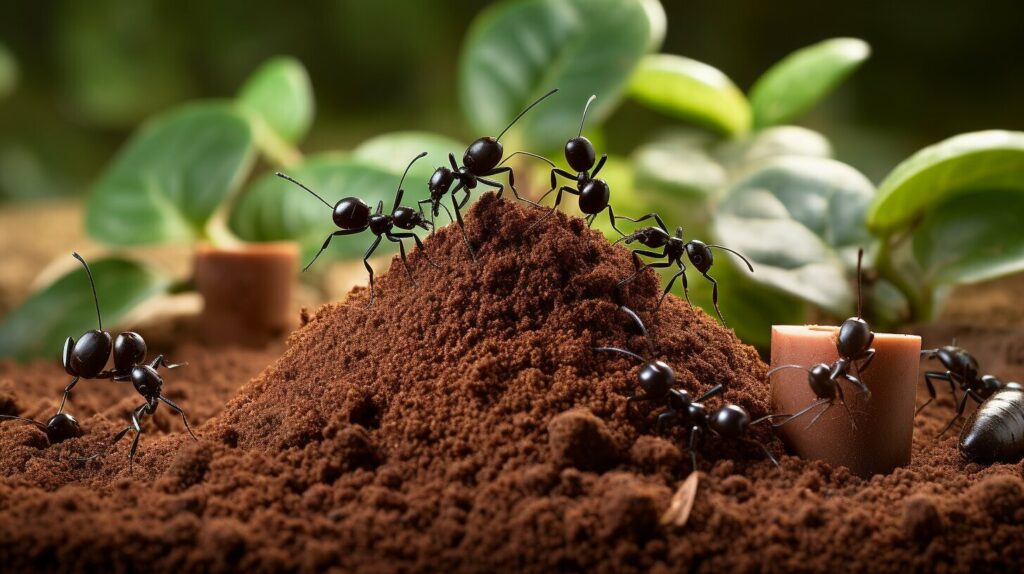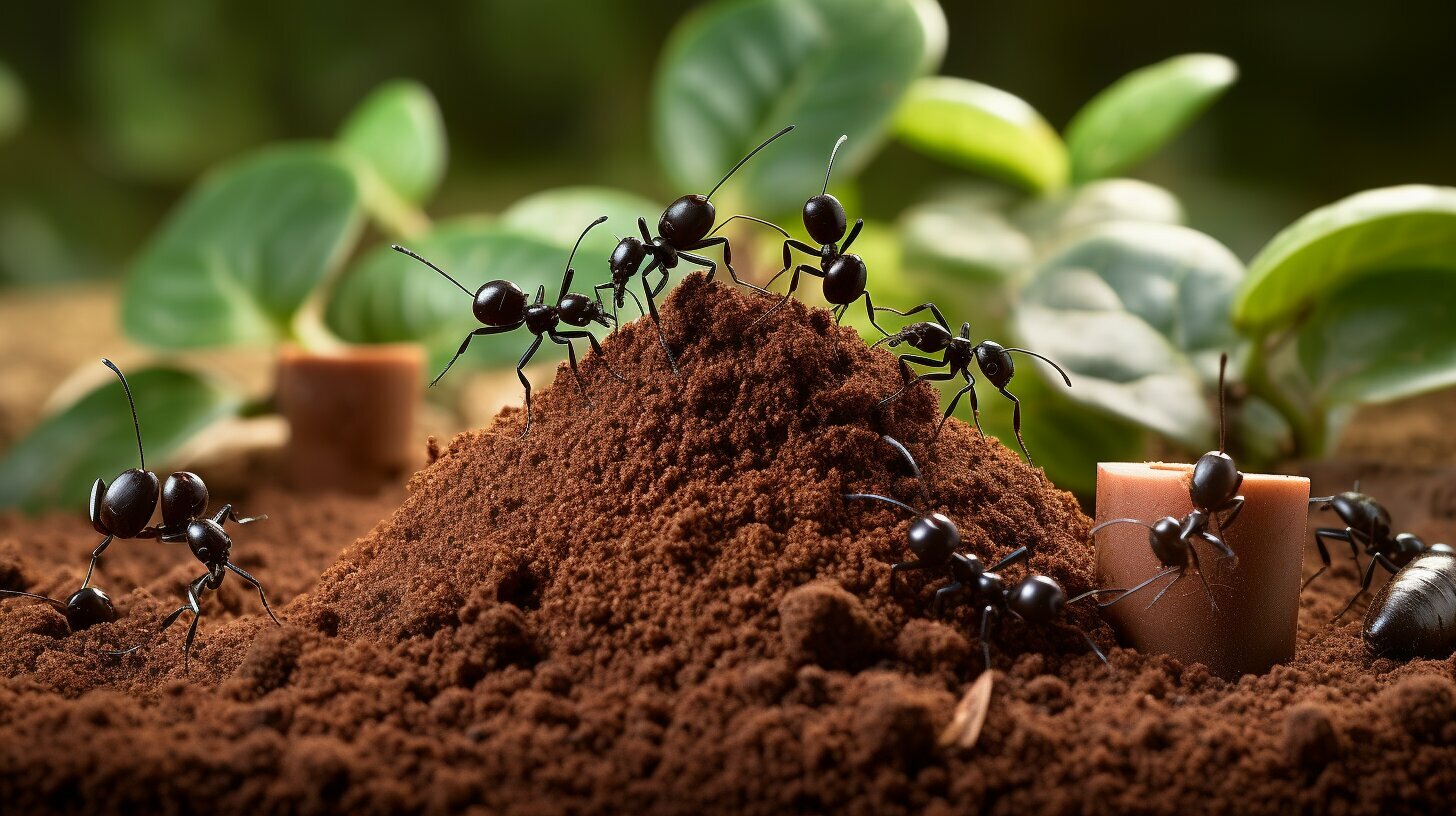
Do Coffee Grounds Kill Ants? Unpacking the Science and Practicality
The persistent march of ants across kitchen counters, picnic baskets, and garden pathways is a familiar frustration. Driven by an unwavering quest for food and shelter, these tiny invaders can quickly become a significant nuisance. In the ongoing battle against these unwelcome guests, homeowners and gardeners alike constantly seek effective and environmentally friendly solutions. Among the many remedies touted, one has gained considerable traction: the use of coffee grounds. But does the seemingly innocuous practice of spreading used coffee grounds around the house and garden actually work? Do coffee grounds kill ants? This article delves into the science behind this popular home remedy, examining its efficacy, practical application, and potential benefits and drawbacks.
The question of whether coffee grounds kill ants is a complex one, with answers that are not always straightforward. While anecdotal evidence abounds, the scientific backing is less definitive. However, the core of the argument lies in the properties of coffee grounds and how they might interact with ants and their environment.
The Science Behind the Buzz: Understanding Coffee Grounds
To understand the potential of coffee grounds as an ant deterrent, it’s crucial to understand their composition. Coffee grounds are primarily composed of caffeine, along with various other compounds such as diterpenes, melanoidins, and phenolic acids. Caffeine is a well-known insecticide, acting as a neurotoxin that can disrupt the nervous systems of insects. Diterpenes, such as cafestol and kahweol, also exhibit insecticidal properties. The strong aroma of coffee, a result of volatile organic compounds (VOCs) released during roasting and brewing, may also play a role in deterring ants.
Theoretically, these components could work in several ways to combat ants. Caffeine could directly poison ants, leading to their death. The strong smell could mask the pheromone trails ants use to navigate and communicate, disorienting them and disrupting their foraging activities. The physical texture of the grounds might also act as a barrier, making it difficult for ants to traverse or build nests.
Does the Theory Hold Up? Examining the Evidence
While the scientific rationale is compelling, the practical effectiveness of coffee grounds in killing ants is a subject of ongoing debate. Some studies suggest that caffeine can indeed be toxic to ants at high concentrations. However, the amount of caffeine present in used coffee grounds is relatively low, often insufficient to deliver a lethal dose. The effectiveness may also depend on the type of ant species, with some being more susceptible to caffeine than others.
Anecdotal evidence provides a mixed bag of results. Many people swear by coffee grounds as an ant repellent, claiming that they successfully drove ants away from their property. Others report little to no effect, observing that the ants simply ignore the grounds or find ways to circumvent them. This inconsistency may be due to several factors, including the freshness of the coffee grounds, the concentration of caffeine, the type of ant, and the environmental conditions.
Putting Coffee Grounds to the Test: Practical Application
If you’re considering using coffee grounds to combat ants, here’s how to maximize your chances of success:
- Freshness Matters: Use fresh, used coffee grounds. The longer they sit, the more their potency diminishes.
- Location, Location, Location: Apply coffee grounds around ant nests, along entry points (windowsills, doorways), and wherever you’ve observed ant activity.
- Create a Barrier: Consider creating a physical barrier by spreading a thick layer of coffee grounds.
- Persistence is Key: Reapply the coffee grounds regularly, especially after rain or watering.
- Combine Strategies: Combine coffee grounds with other ant control methods, such as sealing cracks and crevices, removing food sources, and using commercial ant baits.
The effectiveness of coffee grounds is often enhanced when used preventatively. By regularly applying grounds in areas where ants are likely to appear, you can create an environment that is less hospitable to them.
Potential Benefits Beyond Ant Control
Beyond their potential as an ant deterrent, coffee grounds offer several additional benefits:
- Soil Enrichment: Coffee grounds are a valuable soil amendment. They add organic matter, improve drainage, and provide nutrients to plants.
- Composting: Coffee grounds can be added to compost piles, enriching the compost and accelerating decomposition.
- Odor Control: Coffee grounds can absorb odors, making them useful in refrigerators, garbage cans, and other areas prone to unpleasant smells.
- Natural and Environmentally Friendly: Using coffee grounds is a natural and environmentally friendly alternative to synthetic pesticides.
These additional benefits make coffee grounds an attractive option for gardeners and homeowners who are seeking sustainable solutions.
Drawbacks and Considerations
While coffee grounds offer several advantages, there are also some potential drawbacks to consider:
- Effectiveness Varies: As mentioned earlier, the effectiveness of coffee grounds in killing ants can vary depending on several factors.
- Messy Application: Applying coffee grounds can be messy, especially in windy conditions.
- May Attract Other Pests: While some sources claim coffee grounds repel certain pests, they may attract others, such as snails and slugs.
- Acidity Concerns: Coffee grounds are slightly acidic, which may affect soil pH. However, the effect is generally minimal, and can be beneficial for acid-loving plants.
Careful consideration of these factors will help you determine whether coffee grounds are a suitable ant control method for your specific needs.
Alternative Ant Control Methods
If coffee grounds prove ineffective, or if you’re looking for more comprehensive ant control solutions, several alternative methods are available:
- Ant Baits: Ant baits are a popular and effective method. They contain slow-acting poison that ants carry back to their colony, eradicating the entire population.
- Insecticides: Insecticides can be applied directly to ant nests or used to create barriers. However, use insecticides with caution and follow all safety instructions.
- Diatomaceous Earth (DE): Diatomaceous earth is a natural powder that dehydrates and kills insects.
- Professional Pest Control: For severe infestations, consider hiring a professional pest control service.
Choosing the right ant control method depends on the severity of the infestation, the species of ant, and your personal preferences. In some cases, a combination of methods may be the most effective approach.
The Final Verdict: Do Coffee Grounds Kill Ants?
So, do coffee grounds kill ants? The answer is nuanced. While the scientific evidence is not conclusive, the components in coffee grounds, particularly caffeine, suggest a potential for ant control. However, the effectiveness of coffee grounds varies depending on several factors, including the freshness of the grounds, the concentration of caffeine, and the species of ant. For many, it may be a useful, albeit not foolproof, tool in the fight against ants. Used coffee grounds are a relatively safe, environmentally friendly option that may help deter ants, but it may not be a complete solution.
Ultimately, the best approach to ant control is often a multi-faceted one. Combining coffee grounds with other methods, such as sealing entry points, removing food sources, and using ant baits, can significantly increase your chances of success. If you’re facing a persistent ant problem, experimenting with coffee grounds is certainly worth a try, but don’t expect miracles. Do coffee grounds kill ants? They might, but the results could vary.
Do coffee grounds kill ants? The answer depends on how you approach the problem and what your expectations are. While it may not be a silver bullet, it can be a helpful tool in your ant-fighting arsenal. [See also: Alternative Ant Control Methods] [See also: DIY Pest Control Guide] [See also: Organic Pest Control Options]
Considering the environment, it’s important to understand that coffee grounds themselves are not a guaranteed solution to eliminate ants. The effectiveness of coffee grounds as a tool to kill ants is not fully proven and has variations in its success rates. The ability of coffee grounds to kill ants is impacted by several factors, including the type of ant, the freshness of the coffee grounds, and the concentration of caffeine. However, a key element is the application. You must apply the coffee grounds directly to the ant nests, entry points, and areas where ant activity is observed to maximize their effectiveness. [See also: How to Get Rid of Ants Naturally]
When considering the use of coffee grounds to kill ants, it’s important to have realistic expectations. While some people report success, others experience little to no effect. The efficacy of coffee grounds in killing ants is varied. Coffee grounds are not a guaranteed solution. However, by combining coffee grounds with other ant control methods, you may increase your chances of success. [See also: The Best Ant Baits]
Do coffee grounds kill ants? While the jury is still out, they remain a potentially useful and environmentally friendly option in the ongoing battle against these unwanted pests. The use of coffee grounds to kill ants has been a long-standing practice, but it’s important to have realistic expectations and to be prepared to experiment with different strategies to find what works best for your situation. The use of coffee grounds to kill ants can be a good first step, but it’s rarely the only step you’ll need to take.


